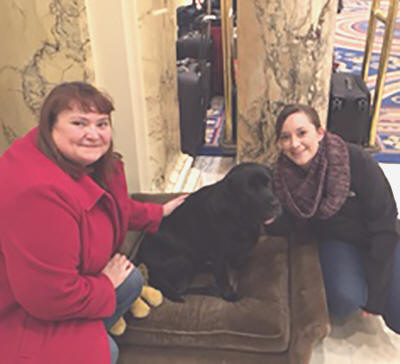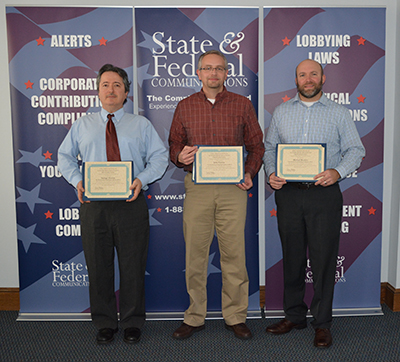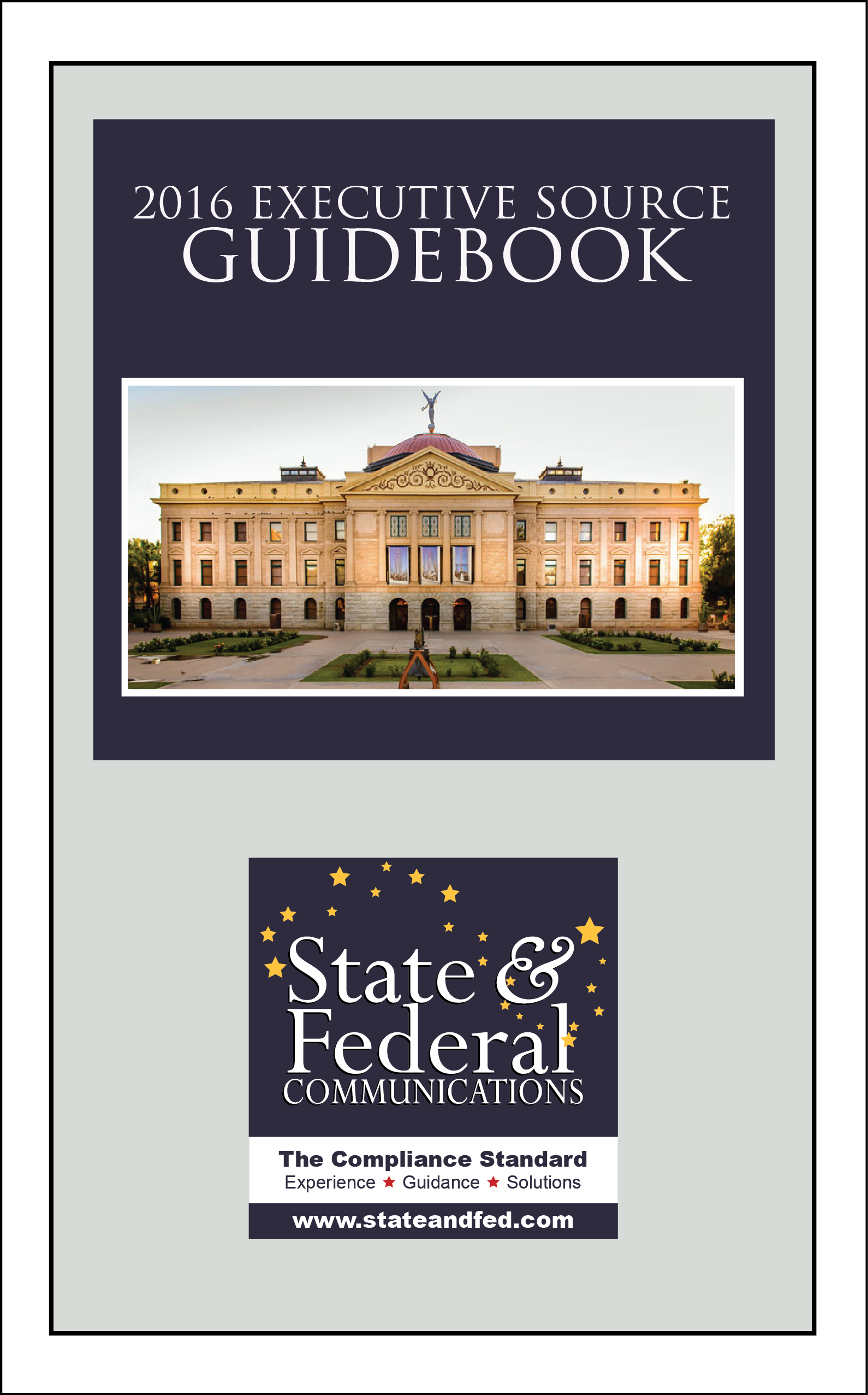Managing a Diverse PAC and Political
Contribution Program
|
Now, that is one sexy topic for a
conference session!! To be honest,
it is a session at the 2016 Public
Affairs Council National PAC
Conference in Miami, Florida and
yours truly is one of the session
leaders along with our good friend
Jennifer Spall, senior director of
political programs at Wal-Mart.
Here is my #1 comment about 2016—If
you are not involved with making
political contributions, you might
as well hibernate. It will be a huge
campaign season—from city, county,
state, and president. Our office is
already vetting contributions for
2018 elections.
Register for the conference at
www.pac.org and hear many of our
contributions colleagues around the
country speak about how important it
is to manage and organize how, when,
and why contributions are made.
And, if that isn’t enough of an
enticement…Plan on joining the State
and Federal Communications team on
Wednesday, March 9th for lunch. We
want to give you the opportunity to
take a tour of our website and see
the important information we provide
to thousands of your counterparts in
corporate and trade association
government affairs firms.
There is a lot to know about
campaign finance and making
political contributions. And,
whether you care about reform or not
(as published by Doug Pinkham’s
December 22nd blog), you do need to
know there are things to keep track
of to protect your organization.
This is the week to promote to your
professional development.
Until next month, remember it is
impossible to have 50 state
political contributions laws in your
head…Join us in Miami and find out
how you can be the expert at your
organization. |
Thank you.
Happy New Year.
Elizabeth Z. Bartz
President and CEO
@elizabethbartz
|
|
|
|
 
Wisconsin
Overhauls Campaign Finance and Eliminates GAB
by
Katlin Newman, Research
Associate
On
December 16, 2015, Wisconsin Gov. Scott Walker signed two bills
eliminating the Government Accountability Board (GAB) and
overhauling state campaign finance laws.
Effective July 1, 2016, Assembly Bill 388 replaces GAB with an
elections commission, to administer and supervise elections, as well
as an ethics commission, to administer and enforce ethics, campaign
finance, and lobbying regulations. Currently, GAB’s six board
members are former judges appointed by the governor and confirmed by
the Senate. Under the new legislation, members for the ethics and
elections commissions will be appointed on a partisan basis by
majority and minority leaders in the Senate, the speaker of the
Assembly, and the minority leader of the Assembly, with the final
two members in each commission selected by gubernatorial nomination
with the advice and consent of the Senate.
Assembly Bill 387, effective January 1, 2016, requires all political
committees and conduits to register with GAB or a local filing
officer prior to accepting any contributions, making any
disbursements, or incurring any obligations. While this appears to
lower the registration threshold, there will likely be fewer
committees required to register based on new committee definitions.
For example, the bill defines an independent expenditure committee
as having the major purpose of making expenditures for express
advocacy. A political action committee is defined as an entity with
express advocacy as its major purpose. Express advocacy refers to
communication containing specific terms referencing a clearly
identified candidate and unambiguously relating to the candidate’s
campaign. Thus, if a communication does not contain terms such as
“vote for,” “vote against,” “elect,” or “defeat” in combination with
a clearly identified candidate, the group may not need to register
or report. Assembly Bill 387 also changes committee reporting dates
and reporting periods.
The
new law doubles state contribution limits and changes the
calculation used to determine contribution limits for local
candidates. Corporations and labor organizations can now contribute
up to $12,000 per calendar year to a segregated fund established and
administered by a political party or legislative campaign committee
for purposes other than making contributions to a candidate
committee or making disbursements for express advocacy. |
|

 Summary of Changes UPDATE Summary of Changes UPDATE
Note Recent Changes to
Compliance Regulations
Michael Beckett, Esq., Research
Manager
CALIFORNIA:
Pursuant to the amendment of regulation 2 C.C.R. §18422, a federal
political committee required to register in California because it is
making expenditures on California candidates or measures must report
as specified in code section 84222(d). Such committees are required
to send major donor notices and expedited nonprofit filer notices. A
federal political committee must determine to whom to send notices
by referring to the most recent donors identified on its federal
reports prior to the date of its expenditure in California. A
multipurpose organization required to register as a committee under
code section 84222(c)(2), (3), or (4) must also send major donor
notices and expedited nonprofit filer notices.
CANADA: The updated Lobbyists’
Code of Conduct, which had not been revised since 1997, became
effective on December 1, 2015. The new code prohibits lobbyists
from lobbying a public official if the lobbyist has campaigned for
or has a business interest with the public official. Lobbyists will
now be held responsible for giving prohibited gifts to public
officials. The revised rules are aimed at increasing transparency
and public trust in officeholders.
FEDERAL: Among the riders in the
federal 2016 Omnibus Appropriations bill passed into law on December
18, 2015, were two provisions affecting campaign finance. Congress
explicitly prohibited the Internal Revenue Service from making new
rules concerning the political speech or activity of 501(c)(4)
organizations. The legislation also prohibits the Securities and
Exchange Commission from issuing regulations requiring corporations
to disclose their political activity to their shareholders. Senate
Bill 1910, the Senate's version of the Financial Services and
General Government Appropriations Act, 2016, contained language
altering the law regarding coordination between candidates and
political parties. However, opposition from both parties prevented
this rider making it in the final passed bill. The final bill also
did not include a rider from House Resolution 2995, the House’s
version of the bill, which would have barred the use of funds to
recommend or require any entity submitting an offer for a federal
contract to disclose specified political contributions as a
condition of submitting the offer.
NEW YORK: The Joint Commission
on Public Ethics (JCOPE) has released additional information for the
state’s
amnesty program to go into effect on January 1, 2016.
Registered lobbyists and established clients of lobbyists are not
eligible for the program, as it only applies to those who have not
submitted any filings between December 10, 2006, and the date
amnesty is applied for. Additionally, applicants must never have
been contacted by JCOPE for noncompliance or been the subject of a
criminal proceeding for a Lobbying Act violation. The program will
run through June 30, 2016.
OREGON: Electronic registration
and reporting is available now and is mandatory beginning January 1,
2016. Registration for the 2016-2017 period can be completed
electronically starting on December 15, 2015. The first report
required to be filed using the electronic system is the 2016 first
quarterly report.
WITCHITA KANSAS: City Council
unanimously approved a measure removing the prohibition on
corporations, unions, and PACs donating to local campaigns. Such
groups will be limited to contributions of $500 per election,
matching the limit on individual contributions and mirroring the
state's restrictions. Proponents of the change believe with the
limit so low, the risk of corporations or PACs swaying an election
is minimal. |
|

Legislation We Are
Tracking
At any given time, more than 1,000
legislative bills, which can affect how you do business as a government
affairs professional, are being discussed in federal, state, and local
jurisdictions. These bills are summarized in State and Federal
Communications' digital encyclopedias for lobbying laws, political
contributions, and procurement lobbying and can be found in the client
portion of our website.
Summaries of major bills are also included
in monthly email updates sent to all clients. The chart below shows the
number of bills we are tracking in regard to lobbying laws, political
contributions, and procurement lobbying.
| |
Total bills |
Number of Jurisdictions |
Passed |
Died |
Carried over
to 2016 |
|
Lobbying Laws |
252 |
50 |
44 |
72 |
92 |
|
Political Contributions |
497 |
51 |
87 |
152 |
207 |
|
Procurement Lobbying |
243 |
40 |
54 |
58 |
54 |
|
|

 |
W E B S I T E
T I P
We have added to the website a resource chart entitled
“Inaugurations Guide --Based on November 2015 Elections.”
The guide provides inaugural information for each
governor elected this past November in Kentucky,
Louisiana, and Mississippi. The chart provides the
governor’s name, inauguration date, rules on tickets to
events, and contributions to inaugural committees. Be
sure to consult the chart if you and your company have
provided or intend to provide resources for these
high-profile and often scrutinized events. Copies of the
inaugural addresses will be added soon. |
|
|

ASK THE
EXPERTS
State and
Federal Communications’ Experts Answer Your Questions
Here
is your chance to “Ask the Experts” at State and Federal
Communications, Inc. Send your questions to
experts@stateandfed.com.
(Of course, we have always been available to answer
questions from clients that are specific to your needs, and
we encourage you to continue to call or email us with
questions about your particular company or organization. As
always, we will confidentially and directly provide answers
or information you need.) Our replies are not legal advice,
just our analysis of laws, rules, and regulations.
|
 |
I am an in-house employee,
however, I am not a registered lobbyist in my
responsible state. Although I engage in lobbying
activities from time to time, I do not meet the state’s
registration threshold. However, other people from my
company are registered. Do I have to disclose my
expenditure and/or compensation for lobbying activities
on company reports? |
|
|
 |
In some
jurisdictions, although you are not a registered
lobbyist, you may be required to include your
expenditures and/or pro rata compensation on either
company or individual lobbyist disclosure reports.
There are many states requiring some level of reporting
for non-lobbyist employees, including Arkansas,
California, Georgia, Illinois,
Indiana, Massachusetts, Michigan, and
Wisconsin.
Every state
handles non-lobbyist reporting in its own unique
manner. For example, in California, you are only
required to include your compensation and reimbursed
expenditures on a quarterly employer report if you spend
more than 10 percent or more of your compensated time in
a calendar month engaging in lobbying activities. In
North Carolina, Illinois, or New Jersey,
permissible expenditures on behalf of public officials
must be reported by the employer or registered
lobbyist.
In the
jurisdictions named above, where your company has an
active lobbying presence, monitoring potential
reportable activity is incredibly important. Although
your level of activity may not necessitate registration
in a state, familiarize yourself with your company’s
roster of registered jurisdictions and compare this
roster with the state’s non-lobbyist reporting
requirements. Then, carefully track activity, which may
include:
-
Compensation for lobbying
activity;
-
Personal reimbursed
expenditures for food, travel, or lodging in
connection with lobbying activity;
-
Expenditures on behalf of
public officials or employees;
-
Sponsorships for events
where public officials or employees will be present
and receive a benefit; and/or
-
The subject matter lobbied,
including agencies contacted.
In sum, as you
are reviewing your potential lobbyist registration
obligations for the new year, it is just as important to
review your potential reporting obligations as a
non-lobbyist employee in the jurisdictions where your
level of activity does not require registration.
January's
Expert - Myra Cottrill Esq., Client Specialist |
|
|

|
|
 |
|

 |
 |
|
Every year, State and Federal
Communications hosts a holiday charitable service
project called Stock the Sleigh. This year, chaired by
Katlin Newman, Sarah Gray, and Joe May, the staff
gathered gifts [from a suggested list] for the patients
at
Akron Children’s Hospital. |
During the 2015 COGEL Conference in
Boston, MA,
Megan Huber-Kovachik and Katlin Newman signed up
to walk a Canine Copley Ambassador, Carly Cople, a
rescue dog,
adopted by the Fairmont Copley Plaza. |
 |
 |
The Association of Government Relations
Professionals awarded their AGRP Lobbying Certificates
to three State and Federal Communications, Inc. staff
members after completing 11 courses
via webinar. They included:
George Ticoras, Esq., Research Associate; John Cozine,
Esq., Compliance Manager; and Michael Beckett, Esq.,
Research Manager. |
The 17th Issue of the State and Federal
Communications, Inc. Executive Source Guidebook has been
printed and is ready to
go out to all of our clients and subscribers.
This value added resource filled with information on
Lobbying Laws, Political Contributions, and Procurement
Lobbying should be used in tandem with our website.
They are not sold separately. |

State and Federal
Communications, Inc.
Celebrates Staff Anniversaries
In December, we celebrated the first
anniversary of Dan Frydl, Marketing and Sales Manager
and the seventh anniversary of
James Warner, Esq., Sr. Compliance Associate.
They are both assets to the State and Federal
Communications team.
|
|
|


Plan to say hello at future
events where State and Federal
Communications, Inc.
will be attending and/or
speaking regarding compliance issues. |
|
Events
|
January 7-9 |
NCSL Executive Winter Meeting,
Salt Lake City, Utah |
|
January 8-10 |
Women in Government State Directors
Meeting, Tampa, Florida |
|
January 9-15 |
PAC Institute, Laguna Beach,
California |
|
January 12 |
WGR Toastmasters, Washington, DC |
|
January 20-22 |
US Conference of Mayors,
Washington, DC |
|
January 24 |
WGR Toastmasters, Washington, DC |
|
January 25-28 |
PAC Grassroots Conference,
Orlando, Florida |
|
COMPLIANCE
NOW is published for our customers and friends.
Click here
to
SUBSCRIBE
or
click
here to UNSUBSCRIBE.
Click here to send us comments regarding
the COMPLIANCE NOW e-newsletter.
State and
Federal Communications, Inc. | Courtyard Square | 80 South
Summit St., Suite 100 | Akron, OH 44308 |
| 330-761-9960 |
330-761-9965-fax | 888-4-LAW-NOW|
http://www.stateandfed.com/

|
 |
The Mission of State
and Federal Communications is
to make sure that your
organization can say, "I Comply."
We are the leading
authority and exclusive information source
on
legislation and regulations surrounding campaign finance
and political contributions; state, federal, and
municipal lobbying; and procurement lobbying.
Contact us to learn how
conveniently our services will allow you to say "I
Comply" for your compliance activities.
http://www.stateandfed.com
|
www.stateandfed.com |
![]() View Full Print-Friendly Version
View Full Print-Friendly Version